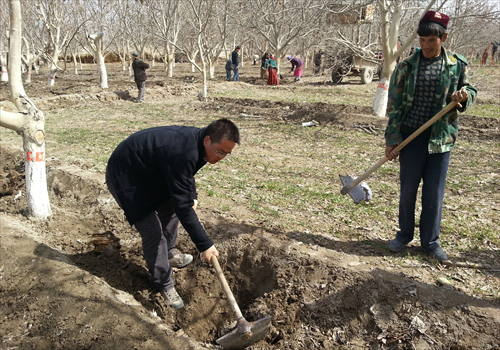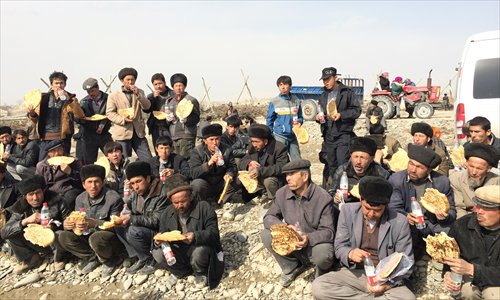HOME >> CHINA
Winning Uyghurs' hearts
By Lin Meilian Source:Global Times Published: 2014-5-11 18:48:01

Zhao Jiangtao plants trees with local Uyghur residents in Aksu Prefecture, Xinjiang Uyghur Autonomous Region. Photo: Courtesy of Zhao Jiangtao
"Wanted: a pair of men's shoes, size 56, or American size 15.5."Just a few hours after sending out that message through social media, Yang Guoqiang received an avalanche of phone calls and messages from people from China, the US and even Mexico who were trying to help.
The shoes were for 41-year-old Huduyum Berdi, a farmer living in Xinjiang Uyghur Autonomous Region who has been unable to buy shoes since he turned 18. He stands at 185 centimeters tall, or 6' 1". This makes it difficult for him to find shoes large enough to fit his feet.
Yang, 31, a press officer with the region's government, was sent to Berdi's village in Hotan Prefecture, southwestern Xinjiang, in April. It was then that he discovered the problem. Yang's trip was part of the region's campaign to send 200,000 officials to over 8,000 villages and 1,000 communities in the coming three years to help improve the livelihoods of local residents.
When Berdi learned that all the officials in the village were helping him find the shoes, he expressed both appreciation and worries: "Thanks for everyone's concern. But I hope they can be less than 100 yuan ($16)."
The next day, he was told that a shoemaker wanted to make him special shoes that would last the rest of his life.
"We came here to build bridges between officials and local residents and to let them know whom they can to turn to when they have troubles," Yang told the Global Times.
The first batch of more than 70,000 officials has already been working in villages since March 5, helping villages solve difficulties ranging from finding shoes to building roads, from access to water to access to the Internet.
The regional government has been sending officials to villages since 1997, but this time, the visits are not focused on boosting the economy, but instead are aimed at "wining local people's hearts."
"The priority of their work is to win local people's hearts, to promote religious harmony, improve livelihoods, maintain social stability and diversify entertainment," Liu Yanmei, a member of the organization department of the regional Communist Party of China Committee, was quoted by the Xinhua News Agency as saying.
Walking the mass line
Xinjiang, as president Xi Jinping puts it, is the "front line on terrorism." The autonomous region has seen a wave of unrest since 2009 when a deadly riot in its capital, Urumqi, killed at least 197 people, mostly Han.
Since then, the relationship between the Han and Muslim Uyghur minority, which takes up over 45 percent of the region's 21 million population, has been tense.
The most recent violence occurred earlier this month. A Uyghur terrorist launched an attack at the exit of a train station in Urumqi, in an incident that killed one and injured at least 79 people.
"The long-term stability of Xinjiang is vital to the whole country's reform," Xi said during a recent inspection tour to Xinjiang in late April.
Xi added that the government will implement policies to improve ethnic harmony, which includes the tradition of relocating officials to villages to eat and live with villagers.
In 2011, over 20,000 officials were sent to villages in Tibet Autonomous Region for a year, this time, the scale is 10 times bigger.
"It surely will have a great impact on both officials and villagers," Turgunjun Tursun, a researcher with the Xinjiang Academy of Social Sciences, told the Global Times. "But it is still too early to say how far it can go."
However, when the campaign was unveiled earlier in February, many officials had doubts, mainly safety concerns, said Zhao Jiangtao, 26, an official at the region's Party Committee Organization Department who was sent to a village of Aksu Prefecture.
Originally from Gansu Province, Zhao graduated from the famous Tsinghua University. He had never been to the southern part of Xinjiang even though he had been working in the region's capital for two years. He immediately applied for the position.
"The idea of going to the southern part where most of the terror attacks happened and finding out the reasons behind them really got me excited," Zhao said.
These officials are mainly from government departments, academic institutions and State-owned enterprises. While one third of staff of each department was sent to villages, the remaining staff members have to cover their work for them, which drew some complaints about workload.

Uyghur residents have a lunch break at the farm in Aksu Prefecture, Xinjiang. Photo: Courtesy of Zhao Jiangtao
Uneasy lifestyleLife in the region's rural areas can be harsh. Long working-hours are common in these places, as villagers often do not have the concept of "weekends." These officials are only allowed to have holidays two times a year.
On March 5, Zhao and another six Han officials arrived in the village where 98 percent of some 1,400 villagers are Uyghurs.
They share a dormitory at the village community center. It has a big, but empty yard. Besides a volleyball court and basketball court in front of their dormitory, they have a plot of land to grow vegetables. The police facility is right next to them, as well as a meeting room, a library, a kitchen and a restaurant.
Besides growing their own food, they have to build their own shower facilities, otherwise they have to drive 70 miles to Aksu to shower.
Yang's situation in Hotan is worse. He can only have a shower once a week due to a lack of water supplies.
As the region has been seeing increasing violence in the last four years, the main concern of the officials is the lack of security. Right after their arrival, the first thing they did was fix the walls of their yard.
Ten days before their departure, their workplace arranged a psychological counseling meeting to ease their worries.
"It helped us to feel less uncertain and more positive about the future," Zhao said.
In 2012, the region's government announced it would deploy 8,000 police officers across all villages to beef up security in the vast countryside, with at least one police officer in each village.
Still, these newcomers have been warned to remain alert at all times. They were asked to go out in groups of three or more, and told that they should not go out in the evening. When they go to visit villagers, the team of seven people is accompanied by at least one Uyghur colleague and several armed police officers or auxiliary police officers who live right next door.
On the same day of the phone interview with Zhao, police in Aksu shot dead an assailant who attacked a police vehicle with knives. Zhao brought some strong flashlights; a weapon that he believes might protect him.
The situation is also tense in Hotan where rioters attacked a local police station with a gasoline bomb last year. And two years before that, police shot dead 14 rioters who attacked a local police station that killed at least four people.
Yang's team installed barbed wire above their wall. Effective or not, at least it helps them sleep.
Among the grass roots
Winning local residents' hearts is one of their main tasks of the "down to the grassroots" campaign. For officials like Zhao, who had never lived in the southern part of the region, it is an opportunity to get to know their Uyghur neighbors.
"When I first came to Xinjiang, I thought all non-Han people were Uyghurs. Later I learned, the hard way, that there are over 40 ethnic minorities here," Zhao recalled.
Language is a barrier that keeps them from getting closer. There are only two Uyghurs who can speak Putonghua in the village. Others have to communicate through body language and eye contact.
The translation mishaps can be entertaining sometimes. "One time a villager borrowed a spade from us and it got broken, so he returned with an old one. We asked where our spade is, he said, 'oh, your spade is dead, so I am giving you another one.'" Zhao said.
The best way to build trust and get closer is to work with villagers, some officials found out. Chen Xuanbo, an official with the region's industry and commerce bureau who was sent to Artushi city, southwest of Xinjiang, helped his Uyghur neighbors to plant fig trees because they lacked labor.
From early morning to late afternoon, Chen's team helped the family to clean out one mu of land, about 666 square-meters, so they could plant trees.
"We worked, we ate and we shared a bowl of water together, that's real friendship," Chen wrote in his diary that was published on the official campaign account, which was circulated by popular messaging app WeChat.
Fighting extremism
The region's vast countryside area is considered a breeding ground for illegal religious activities, which usually attract less educated villagers.
As the region's Party chief Zhang Chunxian says, "striking hard against the 'three forces' is still our top priority to safeguard social stability." These forces are separatism, extremism and terrorism.
On March 13, Zhao's team invited the head of local Islamic association to give a talk about ethnics and religious studies. The event began with national anthems and was carried out in the Uyghur language.
The head said illegal religious activities have ruined Uyghur people's reputation and tarnished their image at home and abroad. And people who carried out these activities did not really understand Islamic doctrines, according to Zhao. The speech lasted for three hours. Over two hundreds villagers participated.
"Religion should be more like sugar for its followers, not opium," Zhao said.
Newspaper headline: Violence in Xinjiang countered with influx of assistance from officials
Posted in: In-Depth